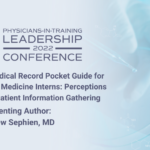Abstract | April 6, 2022
An Electronic Medical Record Pocket Guide for Incoming Internal Medicine Interns: Perceptions and Impact on Patient Information Gathering
Learning Objectives
- Implement a new strategy to ease transition from medical school to residency in regards to EMR systems
Background: The transition of the medical student to intern is associated with a significant increase in workloads and responsibilities. This includes the use of the electronic medical record (EMR), which can also lead to challenges in information gathering and patient care. However, no formal residency interventions exist in the use of EMR for information gathering. This results in most EMR training occurring in the clinical setting.
Goals: The primary goal of this study is to improve information gathering on patient care for internal medicine interns. The secondary goal is to enhance the confidence of interns in information gathering.
Methods: We performed a cross-sectional descriptive study in July 2021. The inclusion criteria were all internal medicine interns at Citrus Memorial Hospital. A pre-confidence survey was distributed to participants during orientation week followed by the introduction of the EMR guide. A pre and post objective-based assessment was done during each participant’s first day of inpatient internal medicine. At the end of each participant’s inpatient internal medicine rotation, a post-confidence and feedback survey was distributed. Descriptive statistics were summarized as mean ± standard deviation. Wilcoxon signed-rank test was used to assess the differences in preand post-continuous data at the 0.05 level of significance.
Results: 20 participants participated in this study. 17 (85%) of participants completed the post-confidence and feedback assessment. 16 (94.1%) of respondents would recommend the EMR guide to future internal medicine interns. Use of EMR guide led to a statistically significant increase in patient information gathering (Pre 73.2% 18.4% vs 94.7% 7.4%, p < 0.001).
Conclusion: The use of an EMR guide was well-received among internal medicine interns and led to comprehensive patient information gathering. Residency programs may benefit from the development of an EMR guide to improve the transition of from medical school to residency.
References and Resources:
- Angus S, Vu TR, Halvorsen AJ, et al. What skills should new internal medicine interns have in july? A national survey of internal medicine residency program directors. Acad Med. 2014;89(3):432-435.
- Raymond MR, Mee J, King A, Haist SA, Winward ML. What new residents do during their initial months of training. Acad Med. 2011;86(10 Suppl):S59-62.
- Gollehon NS, Stansfield RB, Gruppen LD, et al. Assessing Residents’ Competency at Baseline: How Much Does the Medical School Matter? J Grad Med Educ. 2017;9(5):616-621.
- Zavodnick J, Kouvatsos T. Electronic Health Record Skills Workshop for Medical Students. MedEdPORTAL. 2019;15:10849.
- Skelly K, Shen W, Wilbur J, et al. A Curriculum for Teaching Clinical Efficiency Focusing on Specific Communication Skills While Maximizing the Electronic Health Record. MedEdPORTAL. 2020;16:10989.

